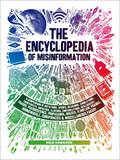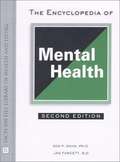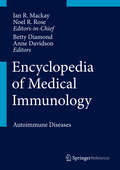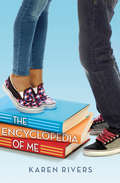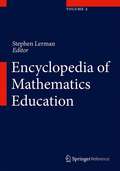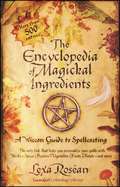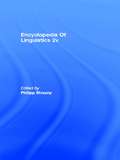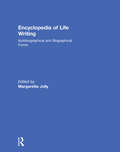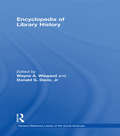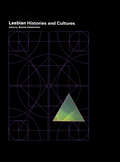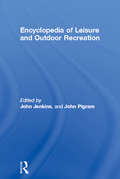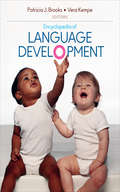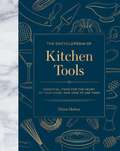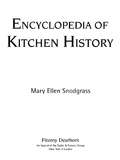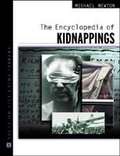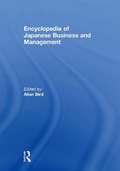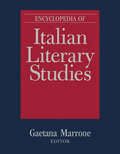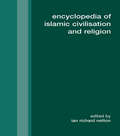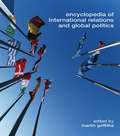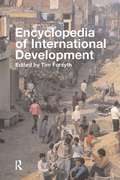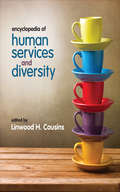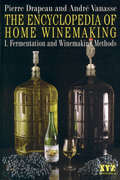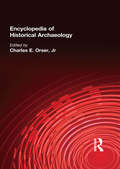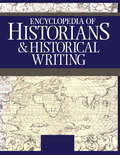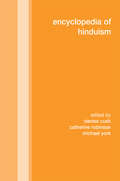- Table View
- List View
The Encyclopedia of Misinformation: A Compendium of Imitations, Spoofs, Delusions, Simulations, Counterfeits, Impostors, Illusions, Confabulations, Skullduggery, ... Conspiracies & Miscellaneous Fakery
by Rex Sorgatz“In an era of ‘alternative facts,’ Rex Sorgatz’s The Encyclopedia of Misinformation helps put things in perspective.” —Fast CompanyThis compendium of misinformation, deception, and self-delusion throughout history examines fakery in the context of science and advertising, humor and law, sports and video games, and beyond. Entries span eclectic topics: Artificial Intelligence, Auto-Tune, Chilean Sea Bass, Clickbait, Cognitive Dissonance, Cryptids, False Flag Operations, Gaslighting, Gerrymandering, Kayfabe, Laugh Tracks, Milli Vanilli, P.T. Barnum, Photoshopping, Potemkin Villages, Ponzi Schemes, Rachel Dolezal, Strategery, Truthiness, and the Uncanny Valley. From A to Z, this is the definitive guide to how we are tricked, and how we trick ourselves.“Occasional salty language and pop-culture references make this compendium of 300 short entries a delightful mix of high- and lowbrow.” —Booklist
The Encyclopedia of Mental Health (2nd edition)
by Ada P. Kahn Jan FawcettIn this second edition of The Encyclopedia of Mental Health, we have added many articles relating to contemporary challenges to good mental health, including the workplace, family and marital relationships, domestic violence, sexual concerns, lifestyle choices, everyday sources of stress, coping with chronic illness and aging. We have also considered cultural differences in the presentation of symptoms, and we included an extensive article about the cross-cultural influences on mental health.
Encyclopedia of Medical Immunology
by Ian R. Mackay Noel R. Rose Betty Diamond Anne DavidsonDifferent from other resources, this volume offers a broad appeal to microbiologists, immunologists, and infectious disease specialists on Autoimmune Diseases. The volume covers topics such as skin and alopecia, Kidney, Liver, Paraneoplastic, Resolution of inflammation, Cardiovascular/systemic inflammation and atherosclerosis, Gut, Regulatory lymphocytes T, B, other and Rheumatic Disease. The volume is written by internationally renowned authors who are authorities in their respective fields.
The Encyclopedia of Me
by Karen RiversA is for "Tink Aaron-Martin," "Aardvark," and "Amazing" in this wonderful alphabetical novel! Tink Aaron-Martin has been grounded AGAIN after an adventure with her best friend Freddie Blue Anderson. To make the time pass, she decides to write an encyclopedia of her life from "Aa" (a kind of lava--okay, she cribbed that from the real encyclopedia) to "Zoo" (she's never been to one, but her brothers belong there). As the alphabet unfolds, so does the story of Tink's summer: more adventures with Freddie Blue (and more experiences in being grounded); how her family was featured in a magazine about "Living with Autism," thanks to her older brother Seb--and what happened after Seb fell apart; her growing friendship, and maybe more, with Kai, a skateboarder who made her swoon (sort of). And her own sense that maybe she belongs not under "H" for "Hideous," or "I" for "Invisible," but "O" for "Okay." Written entirely in Tink's hilarious encyclopedia entries, THE ENCYCLOPEDIA OF ME is both a witty trick and a reading treat for anyone who loves terrific middle-grade novels.
Encyclopedia of Mathematics Education
by Stephen LermanThe Encyclopedia of Mathematics Education is a comprehensive reference text, covering every topic in the field with entries ranging from short descriptions to much longer pieces where the topic warrants more elaboration. The entries provide access to theories and to research in the area and refer to the leading publications for further reading. Links will also be made to particular texts in Springer journals and e-books through SpringerReference. com. The Encyclopedia is aimed at graduate students, researchers, curriculum developers, policy makers, and others with interests in the field of mathematics education. It is planned to be 700 pages in length in its hard copy form but the text will subsequently be up-dated and developed on-line in a way that retains the integrity of the ideas, the responsibility for which will be in the hands of the Editor-in-Chief and the Editorial Board. Editorial Board: Michele ArtigueRuhama EvenMelony GravenEva JablonkaRobyn JorgensenYoshinori ShimizuBharath Sriraman
The Encyclopedia of Magickal Ingredients
by Lexa RoseanBringing the art and magick of casting spells to the masses, Lexa Rosean is the new face of Wicca. In The Encyclopedia of Magickal Ingredients she provides beginner and experienced practitioners of spellcasting with a quick, easy, and accurate guide to the magickal powers and properties of herbs, spices, flowers, vegetables, fruits, metals, and colors -- more than 500 ingredients in all. With this info at your fingertips, you can craft spells for specific desires or needs -- whether it's love, luck, fertility, or even next month's rent! Written with passion for the craft and a deep understanding of the needs of modern-day Wiccans, The Encyclopedia of Magickal Ingredients is an indispensable addition to every occult library and an essential reference for all with the gift of magick.
Encyclopedia of Linguistics
by Philipp StraznyUtilizing a historical and international approach, this valuable two-volume resource makes even the more complex linguistic issues understandable for the non-specialized reader. Containing over 500 alphabetically arranged entries and an expansive glossary by a team of international scholars, the Encyclopedia of Linguistics explores the varied perspectives, figures, and methodologies that make up the field.
Encyclopedia of Life Writing: Autobiographical and Biographical Forms
by Margaretta JollyFirst published in 2001. Routledge is an imprint of Taylor & Francis, an informa company.
Encyclopedia of Library History
by Wayne A. Wiegand Donald G. DavisFirst Published in 1994. Routledge is an imprint of Taylor & Francis, an informa company.
Encyclopedia of Lesbian Histories and Cultures: An Encyclopedia (Encyclopedias of Contemporary Culture)
by Bonnie ZimmermanA rich heritage that needs to be documented Beginning in 1869, when the study of homosexuality can be said to have begun with the establishment of sexology, this encyclopedia offers accounts of the most important international developments in an area that now occupies a critical place in many fields of academic endeavours. It covers a long history and a dynamic and ever changing present, while opening up the academic profession to new scholarship and new ways of thinking. A groundbreaking new approach While gays and lesbians have shared many aspects of life, their histories and cultures developed in profoundly different ways. To reflect this crucial fact, the encyclopedia has been prepared in two separate volumes assuring that both histories receive full, unbiased attention and that a broad range of human experience is covered. Written for and by a wide range of people Intended as a reference for students and scholars in all fields, as well as for the general public, the encyclopedia is written in user-friendly language. At the same time it maintains a high level of scholarship that incorporates both passion and objectivity. It is written by some of the most famous names in the field, as well as new scholars, whose research continues to advance gender studies into the future.
Encyclopedia of Leisure and Outdoor Recreation
by John M. Jenkins John J. PigramThis is a key reference guide for the exploration of leisure and outdoor recreation. It reflects the multidisciplinary nature of these fields and contextualizes the leading research and knowledge on key concepts, theories and practices. Edited by leading authorities in the field, this volume includes a comprehensive index, and up-to-date suggestions for further reading. It is an essential resource for teaching, an invaluable companion to independent study, and a solid starting point for wider subject exploration.
Encyclopedia of Language Development
by Dr Patricia J. Brooks Vera KempeThe progression from newborn to sophisticated language user in just a few short years is often described as wonderful and miraculous. What are the biological, cognitive, and social underpinnings of this miracle? What major language development milestones occur in infancy? What methodologies do researchers employ in studying this progression? Why do some become adept at multiple languages while others face a lifelong struggle with just one? What accounts for declines in language proficiency, and how might such declines be moderated? Despite an abundance of textbooks, specialized monographs, and a couple of academic handbooks, there has been no encyclopedic reference work in this area--until now. The Encyclopedia of Language Development covers the breadth of theory and research on language development from birth through adulthood, as well as their practical application. Features: This affordable A-to-Z reference includes 200 articles that address such topic areas as theories and research tradition; biological perspectives; cognitive perspectives; family, peer, and social influences; bilingualism; special populations and disorders; and more. All articles (signed and authored by key figures in the field) conclude with cross reference links and suggestions for further reading. Appendices include a Resource Guide with annotated lists of classic books and articles, journals, associations, and web sites; a Glossary of specialized terms; and a Chronology offering an overview and history of the field. A thematic Reader’s Guide groups related articles by broad topic areas as one handy search feature on the e-Reference platform, which includes a comprehensive index of search terms. Available in both print and electronic formats, Encyclopedia of Language Development is a must-have reference for researchers and is ideal for library reference or circulating collections.
The Encyclopedia of Kitchen Tools: Essential Items for the Heart of Your Home, And How to Use Them
by Elinor HuttonThe ultimate reference book for home cooks, seasoned chefs, and everyone in between, The Encyclopedia of Kitchen Tools guides readers through the history, practical uses, design features, and storage and maintenance requirements of each of the tools living in their kitchen cabinets. Whether you're a home cook pondering the difference between a cookie sheet and a baking pan (one of life's great questions), or a professional chef wondering whether you should sharpen your knives with a whetstone, a honing rod, or an electric sharpener, The Encyclopedia of Kitchen Tools has the answers you're looking for. Ranging from knives and spatulas, ladles and tongs, to Dutch ovens and crock pots, citrus reamers and zesters, The Encyclopedia of Kitchen Tools offers you a chance to reconsider all of the kitchen accessories you've accumulated over the years, as well as the opportunity to encounter some new tools for the first time.With additional sidebars discussing a wide variety of topics including the history of elaborate table settings, the best types of cocktail strainers (yes, there's more than one), the cleanliness of salt pigs, and the best ways to care for cast iron, The Encyclopedia of Kitchen Tools is the new, must-have reference bible for active cooks and armchair chefs alike.
Encyclopedia of Kitchen History
by Mary Ellen SnodgrassFirst published in 2005. Routledge is an imprint of Taylor & Francis, an informa company.
The Encyclopedia of Kidnappings
by Michael NewtonAn A-to-Z encyclopedia of kidnappings that have taken place throughout history, from Viking raids and Aztec sacrifices to modern-day political kidnappings. Alphabetically arranged by subject, organization, and victims' and kidnappers' names, the volume contains nearly 1,000 entries.
Encyclopedia of Japanese Business and Management
by Allan BirdThe Encyclopedia of Japanese Business and Management is the definitive reference source for the exploration of Japanese business and management. Reflecting the multidisciplinary nature of this field, the Encyclopedia consolidates and contextualises the leading research and knowledge about the Japanese business system and Japanese management thought and practice. It will be welcomed by scholar and student alike as an essential resource for teaching, an invaluable companion to independent study, and a solid starting point for wider exploration.
Encyclopedia of Italian Literary Studies
by Luca Somigli Gaetana Marrone Paolo PuppaThe Encyclopedia of Italian Literary Studies is a two-volume reference book containing some 600 entries on all aspects of Italian literary culture. It includes analytical essays on authors and works, from the most important figures of Italian literature to little known authors and works that are influential to the field. The Encyclopedia is distinguished by substantial articles on critics, themes, genres, schools, historical surveys, and other topics related to the overall subject of Italian literary studies. The Encyclopedia also includes writers and subjects of contemporary interest, such as those relating to journalism, film, media, children's literature, food and vernacular literatures. Entries consist of an essay on the topic and a bibliographic portion listing works for further reading, and, in the case of entries on individuals, a brief biographical paragraph and list of works by the person. It will be useful to people without specialized knowledge of Italian literature as well as to scholars.
Encyclopedia of Islamic Civilization and Religion
by Ian Richard NettonThe Encyclopedia of Islamic Civilization and Religion provides scholarly coverage of the religion, culture and history of the Islamic world, at a time when that world is undergoing considerable change and is a focus of international study and debate. The non-Muslim world's perceptions of Islam have often tended to be dominated by unrepresentative radical extremist movements and media interpretations of events involving such movements, to the extent that many people are unaware of the depth and variety of Islamic thought. At the same time, many who have had a formal training in Islamic studies have tended to concentrate on the traditional, to the exclusion of the contemporary. The Encyclopedia of Islamic Civilization and Religion covers the full range of Islamic thought, in historical depth, but it also provides substantial coverage of contemporary trends across the Muslim world. With well over a thousand entries on Islamic theology, history, arts, science, law and institutions, and coverage of Islam in individual countries and cities around the world, the Encyclopedia of Islamic Civilization and Religion provides an extremely rich resource for students and researchers in religious studies and Middle Eastern studies. Entries are cross-referenced and bibliographies are provided. There is a full index. Routledge published The Qura'n: An Encyclopedia in 2005, an excellent companion to the Encyclopedia of Islamic Civilization and Religion.
Encyclopedia of International Relations and Global Politics
by Martin GriffithsThe study of international relations has changed rapidly in recent years. Firstly as a consequence of major political and economic change – the end of the cold war and the fall of communism, the resurgence of nationalism, terrorism and forms of fundamentalism, globalization – and secondly, linked with these developments, because of the vitality of the discipline, with ongoing debates on the fundamental paradigms for the understanding of international relations and the emergence of the perspectives of feminism, postmodernism, constructivism and critical theory. The Routledge Encyclopedia of International Relations and Global Politics provides a unique reference source for students and academics covering all aspects of global international relations and the contemporary discipline across IR's major subject divisions of diplomacy, military affairs, international political economy, and theory. Written by a distinguished group of international scholars, the Encyclopedia is largely comprised of substantial entries of more than 1,000 words, with fifty major entries of 5,000 words on core contemporary topics. Each entry is fully cross-referenced and followed by a listing of complementary entries and a short bibliography for further reading. The whole is comprehensively indexed. There is no other resource of its kind and the Encyclopedia of International Relations and Global Politics will be an extremely valuable addition to all libraries supporting teaching and research in the social sciences.
Encyclopedia of International Development
by Tim ForsythInternational development is now a major global activity and the focus of the rapidly growing academic discipline of development studies. The Encyclopedia of International Development provides definitions and discussions of the key concepts, controversies and actors associated with international development for a readership of development workers, teachers and students. With 600 entries, ranging in length from shorter factual studies to more in-depth essays, a comprehensive system of cross references and a full index, it is the most definitive guide to international development yet published. Development is more than a simple increase in a country's wealth and living conditions. It also implies increasing people's choices and freedoms; it is change that is inclusive and empowering. Development theory and practice has important applications to questions of economic growth, trade, governance, education, healthcare, gender rights and environmental protection, and it involves issues such as international aid, peacekeeping, famine relief and strategies against HIV/AIDS. The Encyclopedia treats these topics and many more, and provides critical analyses of important actors within development such as the United Nations and World Bank, non-governmental organizations and corporations. Contributors to this volume reflect the multidisciplinary and international nature of the subject. They come from social science disciplines such as economics, international studies, political science and anthropology, and from specialities such as medicine. This Encyclopedia provides crucial information for universities, students and professional organizations involved with international development, and those interested in related topics such as international studies or other studies of social and economic change today.
Encyclopedia of Human Services and Diversity
by Linwood CousinsEncyclopedia of Human Services and Diversity is the first encyclopedia to reflect the changes in the mission of human services professionals as they face today’s increasingly diverse service population. Diversity encompasses a broad range of human differences, including differences in ability and disability, age, education level, ethnicity, gender, geographic origin, religion, sexual orientation, socioeconomic class, and values. Understanding the needs and problems of Asian Americans, Hispanic Americans, the deaf, the blind, the LGBT community, and many other groups demands an up-to-date and cutting-edge reference. This three-volume encyclopedia provides human services students, professors, librarians, and practitioners the reference information they need to meet the needs of an increasingly diverse population. Features: 600 signed entries are organized A-to-Z across three volumes. Entries, authored by key figures in the field, conclude with cross references and further readings. A Reader’s Guide groups related articles within broad, thematic areas, such as aging, community mental health, family and child services, substance abuse, etc. A detailed index, the Reader’s Guide, and cross references combine for search-and-browse in the electronic version. A helpful Resource Guide guides students to classic books, journals, and web sites, and a glossary assists them with the terminology of the field. Available in both print and electronic formats, Encyclopedia of Human Services and Diversity is an ideal reference for students, practitioners, faculty and librarians.
The Encyclopedia of Home Winemaking
by André Vanasse Pierre DrapeauThe home wine market has grown by leaps and bounds in the last decade. The clear and well-ordered explanations in The Encyclopedia of Home Winemaking make it easy reading for the home winemaker and an essential reference guide that will be used for years.
Encyclopedia of Historical Archaeology
by Charles E. OrserThe Encyclopedia of Historical Archaeology is a ground-breaking compendium of information about this ever-growing field. Concentrating on the post-1400 period as well as containing generic explanations of historical archaeology where needed, the encyclopedia is compiled by over 120 experts from around the world and contains more than 370 entries covering important concepts and sites.
Encyclopedia of Historians and Historical Writing
by Kelly BoydThe Encyclopedia of Historians and Historical Writing contains over 800 entries ranging from Lord Acton and Anna Comnena to Howard Zinn and from Herodotus to Simon Schama.Over 300 contributors from around the world have composed critical assessments of historians from the beginning of historical writing to the present day, including individuals from related disciplines like Jürgen Habermas and Clifford Geertz, whose theoretical contributions have informed historical debate.Additionally, the Encyclopedia includes some 200 essays treating the development of national, regional and topical historiographies, from the Ancient Near East to the history of sexuality.In addition to the Western tradition, it includes substantial assessments of African, Asian, and Latin American historians and debates on gender and subaltern studies.
Encyclopedia of Hinduism
by Denise Cush, Catherine Robinson and Michael YorkThe Encyclopedia of Hinduism contains over 900 entries reflecting recent advances in scholarship which have raised new theoretical and methodological issues as well as identifying new areas of study which have not been addressed previously. The debate over the term 'Hinduism' in the light of post-Orientalist critiques is just one example of how once standard academic frameworks have been called into question. Entries range from 150-word definitions of terms and concepts to 5,000-word in-depth investigations of major topics. The Encyclopedia covers all aspects of Hinduism but departs from other works in including more ethnographic and contemporary material in contrast to an exclusively textual and historical approach. It includes a broad range of subject matter such as: historical developments (among them nineteenth and twentieth century reform and revival); geographical distribution (especially the diaspora); major and minor movements; philosophies and theologies; scriptures; deities; temples and sacred sites; pilgrimages; festivals; rites of passage; worship; religious arts (sculpture, architecture, music, dance, etc.); religious sciences (e.g. astrology); biographies of leading figures; local and regional traditions; caste and untouchability; feminism and women's religion; nationalism and the Hindu radical right; and new religious movements. The history of study and the role of important scholars past and present are also discussed. Accessibility to all levels of reader has been a priority and no previous knowledge is assumed. However, the in-depth larger entries and the design of the work in line with the latest scholarly advances means that the volume will be of considerable interest to specialists. The whole is cross-referenced and bibliographies attach to the larger entries. There is a full index.
